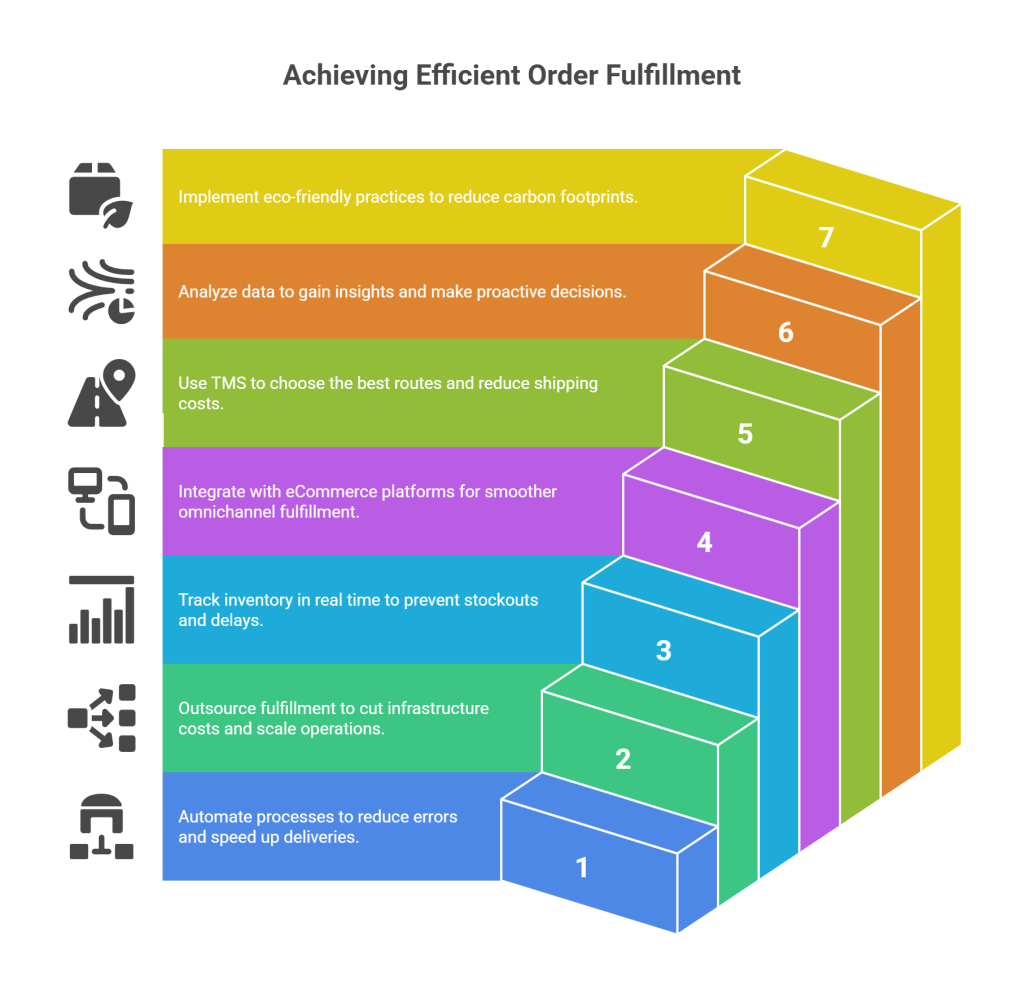In today’s fast-paced eCommerce and logistics landscape, 3PL technology has become essential for businesses aiming to streamline their order fulfillment processes. Third-party logistics (3PL) providers leverage advanced technology to optimize inventory management, warehouse automation, and shipping, ensuring seamless operations. But what exactly is this technology, and how does it benefit businesses? Let’s explore.

What Is 3PL Technology?
Third-party technology refers to the advanced software, tools, and automation solutions used by third-party logistics providers to improve order fulfillment, inventory management, and shipping operations. This technology helps businesses reduce operational costs, enhance delivery speed, and improve customer satisfaction.
Key Components of 3PL Technology
- Warehouse Management Systems (WMS) – Tracks inventory, optimises warehouse layout, and manages order picking.
- Transportation Management Systems (TMS) – Helps in route optimisation, carrier selection, and real-time tracking.
- Order Management Systems (OMS) – Integrates sales channels to ensure accurate order processing.
- Automation & Robotics – Uses AI-driven robotic picking, sorting, and packaging to enhance efficiency.
- Data Analytics & AI – Provides predictive insights for demand forecasting and inventory optimisation.
Benefits of 3PL Solutions for Order Fulfillment

1. Improved Order Accuracy & Speed
3PL technology automates inventory management and picking processes, reducing errors in order fulfillment. AI-driven barcode scanning, RFID tracking, and automated sorting help ensure accurate and fast deliveries.
2. Cost Savings & Scalability
With 3PL services, businesses cut down on infrastructure costs by outsourcing fulfillment to experts. Companies can scale operations efficiently, whether handling 100 or 10,000 orders per day.
3. Real-Time Inventory Visibility
Advanced WMS and cloud-based dashboards allow businesses to track inventory in real time. This helps prevent stockouts, overstocking, and fulfillment delays.
4. Seamless Multi-Channel Integration
Modern 3PL technology integrates with eCommerce platforms, ERPs, and marketplaces, ensuring smoother omnichannel fulfillment. Businesses selling on Amazon, Shopify, or Walmart can sync inventory effortlessly.
5. Optimized Last-Mile Delivery
A robust TMS (Transportation Management System) chooses the best carrier and route, reducing shipping delays and costs. GPS tracking and AI-driven route planning improve last-mile efficiency.
6. Data-Driven Decision-Making
AI-powered data analytics tools in 3PL technology provide insights into customer demand, warehouse efficiency, and logistics performance, enabling proactive decision-making.
7. Sustainability & Eco-Friendly Logistics
Many 3PL providers use sustainable packaging, fuel-efficient routes, and AI-driven inventory optimisation, reducing carbon footprints in logistics.
How 3PL Software Works in Order Fulfillment
- Order Placement & Integration – The system integrates with eCommerce platforms, syncing orders automatically.
- Inventory Processing & Picking – WMS identifies the nearest fulfillment center, assigns inventory, and triggers picking.
- Automated Packing & Labeling – AI-driven robots or automated conveyor systems handle packing with precision.
- Shipping & Delivery Optimization – TMS selects the best carrier and delivery route, ensuring on-time shipping.
- Real-Time Tracking & Customer Notifications – Customers receive automated tracking updates.
- Returns & Reverse Logistics – AI-based systems manage returns efficiently, reducing costs and delays.
How 3PL Tech Enhances Order Fulfillment Efficiency
1. AI-Powered Demand Forecasting
Predicting customer demand accurately prevents overstocking or stockouts, reducing unnecessary storage costs. 3PL technology trends like AI analytics decode purchasing patterns, seasonal trends, and market conditions, enabling businesses to maintain optimal inventory levels.
2. Cloud-Based Supply Chain Visibility
With real-time cloud integration, 3PL services allow businesses to monitor their entire supply chain—from inventory storage to last-mile delivery. Cloud-based dashboards provide actionable insights, order tracking, and real-time stock updates, ensuring seamless coordination between suppliers, warehouses, and retailers.
3. Contactless & Automated Warehousing
Advanced 3PL services enable warehouses to implement automated sorting, robotic picking, and contactless packaging. This speeds up fulfillment, improves accuracy, and reduces labor-intensive tasks.
4. IoT and Smart Sensors in Logistics
IoT-enabled devices track temperature, humidity, and package conditions for sensitive shipments, such as pharmaceuticals, food, and perishable goods. Smart sensors alert logistics managers in case of temperature fluctuations, ensuring compliance with regulatory standards.
Want to learn the difference between 3PL Vs 4PL? Check out our detailed blog here.
How 3PL Services Support Omnichannel Fulfillment
Omnichannel retailing requires seamless coordination between multiple sales channels, whether it’s an eCommerce platform, physical store, or third-party marketplace. 3PL-logistics technology enables:
- Automated Order Routing – Directs orders to the nearest fulfillment center, ensuring fast deliveries.
- Unified Inventory Management – Keeps stock levels synchronized across multiple warehouses and sales channels.
- Returns Processing Automation – Simplifies reverse logistics, reducing costs and processing times.
The Role of Blockchain in 3PL Technology
Blockchain is revolutionising 3PL technology by enhancing supply chain transparency and security. With a decentralised ledger system, businesses can:
🔹 Track product origins and prevent fraud.
🔹 Improve compliance with international trade regulations.
🔹 Securely share supply chain data with partners.
Blockchain-driven smart contracts automate payments, shipments, and compliance checks, making order fulfillment more secure and efficient.
Choosing the Right 3PL Service Provider
When selecting a 3PL service provider, businesses should consider:
- Scalability – Can the solution grow with business needs?
- Integration Capabilities – Does it sync with ERP, CRM, and eCommerce platforms?
- Data Security & Compliance – Does it comply with industry regulations like GDPR, HIPAA, or FDA standards?
Why Is 3PL Technology Essential for Modern Businesses?
In the digital age, where same-day and next-day delivery have become the norm, businesses need 3PL platforms to stay competitive. Companies across eCommerce, healthcare, retail, and manufacturing leverage these advanced solutions to enhance efficiency, reduce costs, and meet customer expectations.
Common Challenges and Solutions in 3PL Technology Implementation
| Challenge | Solution |
| Integration issues with existing systems | Choose API-compatible 3PL technology for seamless integration. |
| High setup costs | Opt for cloud-based 3PL solutions with flexible pricing. |
| Security concerns | Ensure encrypted data storage and compliance with regulations. |
| Inventory mismanagement | Use real-time tracking and AI-driven forecasting. |
Conclusion
3PL technology is transforming order fulfillment, helping businesses achieve accuracy, speed, and scalability in logistics. With AI-driven automation, real-time tracking, and multi-channel integration, companies can enhance efficiency and customer satisfaction. Whether you’re an eCommerce startup or a global enterprise, adopting 3PL is a game-changer for future-ready logistics.
Want to optimise your supply chain process? Contact Qodenext today.
FAQs – 3PL Technology
1. What is the difference between 3PL and traditional logistics?
3PL -driven logistics use automation, AI, and real-time data tracking, unlike traditional logistics, which rely on manual processes and legacy systems.
2. Is a 3PL provider suitable for small businesses?
Yes! Many cloud-based 3PL solutions offer affordable, scalable fulfillment services for small businesses.
3. How does a 3PL provider improve customer experience?
It enables faster deliveries, accurate tracking, and automated updates, enhancing customer satisfaction.
4. What should businesses consider before choosing a 3PL provider?
Look for WMS/TMS integration, automation capabilities, multi-channel support, scalability, and security compliance.
5. Is a 3PL provider cost-effective?
Yes, it reduces warehousing, labor, and shipping costs, making fulfillment more efficient and affordable.
6. Can 3PL technology support international shipping and global logistics?
Yes, most modern 3PL solutions are equipped to handle international shipping by integrating with global carrier networks, supporting customs documentation, and providing real-time tracking across borders. This enables businesses to expand easily into new markets while simplifying regulatory compliance and managing cross-border complexities.
7. How does automation in 3PL warehouses benefit businesses?
Automation—through AI-driven robots, automated sorting, and smart packaging—reduces labor-intensive manual work, minimizes picking and packing errors, and speeds up order fulfillment. As a result, businesses enjoy faster turnaround, higher order accuracy, and lower operational costs.
8. What role does data analytics play in 3PL solutions?
Data analytics in 3PL technology enables businesses to analyze past and current data trends, monitor warehouse efficiency, and forecast future demands. Using predictive analytics, companies can better anticipate inventory needs, improve demand planning, and make informed decisions to boost overall supply chain performance.
9. Are 3PL solutions customizable for specific industry needs?
Yes, leading 3PL service providers offer customizable platforms that can be tailored to the unique requirements of different industries such as eCommerce, healthcare, food and beverage, and manufacturing. This flexibility ensures regulatory compliance, specialized storage, temperature-controlled logistics, and more.
10. What ongoing support do businesses receive from 3PL providers?
Dependable 3PL providers offer continuous support, including dedicated account managers, 24/7 customer service, performance analytics, regular updates on shipment status, and proactive alerts for potential logistics issues. This ongoing partnership ensures smooth operations and quick resolution of any challenges that may arise.






